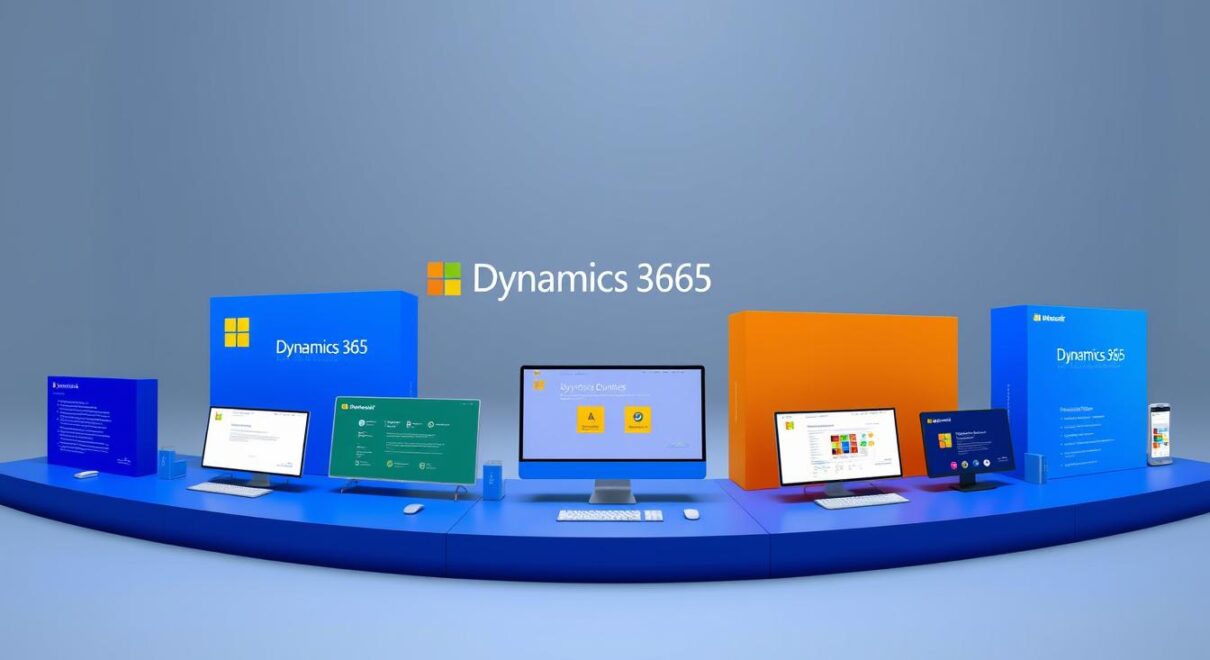Microsoft Dynamics is a powerful suite of business software applications. It helps companies streamline operations, boost productivity, and drive growth. This innovative solution caters to organizations of all sizes.
Microsoft Dynamics 365 consists of smart business apps for various company aspects. These tools manage finance, supply chain, customer relationships, and marketing. They work together to provide a complete view of your business.
Flexibility is a key strength of Microsoft Dynamics. You can customize these apps to fit your unique needs. Regular updates and new features are released monthly. This ensures you have the latest tools to stay competitive.
Microsoft Dynamics 365 is more than just software; it’s about achieving success. The FastTrack program offers customer success guidance. You also get technical advice and best practices.
The Microsoft Customer Stories website showcases real-world experiences. You can explore how companies like yours have benefited from this software.
Key Takeaways
- Microsoft Dynamics 365 is a suite of intelligent business applications
- It offers both cloud-based and on-premises solutions
- Regular updates keep you at the forefront of business technology
- FastTrack program provides guidance for implementation and optimization
- Real customer stories showcase practical applications across industries
- Extensive documentation and community support are available
Understanding Microsoft Dynamics Ecosystem
Microsoft Dynamics is a powerful suite of business apps. It streamlines operations and boosts productivity. The ecosystem combines ERP and CRM solutions for comprehensive business management.
Microsoft Dynamics Product Suite Overview
The Microsoft Dynamics product suite includes several key components:
- Dynamics 365: A cloud-based platform integrating ERP and CRM functionalities
- Dynamics GP: A robust financial management solution
- Dynamics NAV: An ERP system for small to mid-sized businesses
- Dynamics AX: An enterprise-level ERP solution
Each product addresses specific business needs. They cover financial management and customer relationship management.
Cloud-Based vs On-Premises Solutions
Microsoft Dynamics offers flexible deployment options:
| Cloud-Based | On-Premises |
|---|---|
| Accessible via web browsers | Installed on local servers |
| Regular automatic updates | Greater control over updates |
| Scalable resources | Fixed infrastructure |
| Lower upfront costs | Higher initial investment |
Integration with Microsoft Technologies
Microsoft Dynamics integrates smoothly with other Microsoft products. This boosts productivity and streamlines workflows across your organization.
Dynamics CRM works with Office 365 for easy customer data access. NAV and AX sync with Power BI for advanced analytics.
AccuWeather serves over a billion people with weather forecasts. They use Dynamics 365 for its scalability and flexibility. It optimizes efficiency through Office 365 integration.
This ecosystem creates a unified business solution. It adapts to various needs, making it powerful for all business sizes.
What Is A Microsoft Dynamics
Microsoft Dynamics is a powerful business software suite that streamlines operations and boosts productivity. It combines enterprise resource planning (ERP) and customer relationship management (CRM) for businesses of all sizes.
The platform uses a modular approach, letting companies start small and grow. It includes apps for sales, marketing, customer service, finance, and supply chain management.
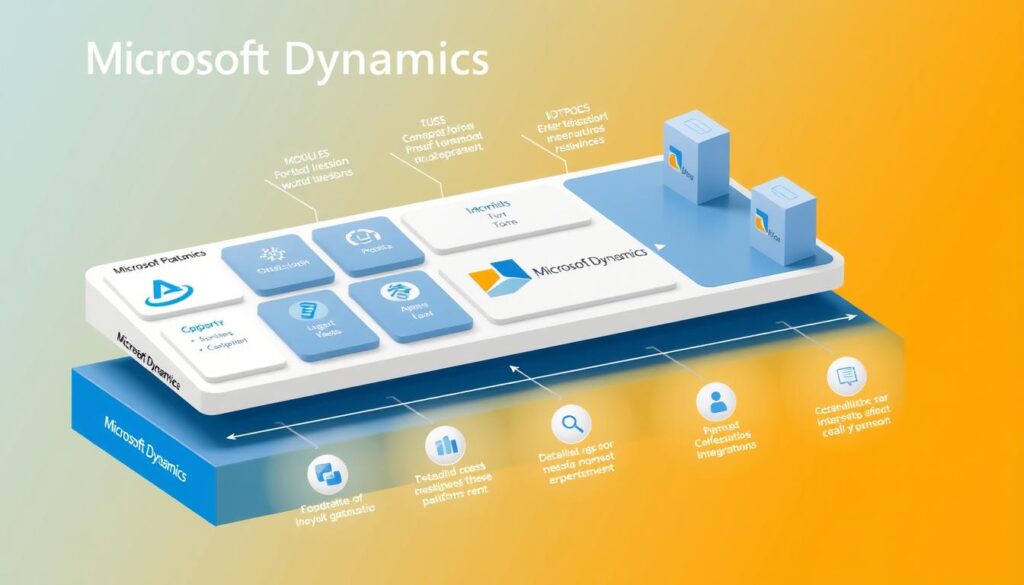
Microsoft Dynamics integrates seamlessly with Excel, Word, and Teams. This creates a smooth workflow across organizations. It also connects with Azure, providing secure and scalable cloud services.
Key microsoft dynamics capabilities include AI-powered tools for lead generation and customer relationships. Real-time reporting and AI insights improve decision-making. Predictive analytics optimize supply chains.
The platform offers automated email and social media campaigns. It also provides human resources management for recruitment and onboarding.
- AI-powered tools for lead generation and customer relationship enhancement
- Real-time reporting and AI insights for improved decision-making
- Predictive analytics for supply chain optimization
- Automated email and social media campaigns
- Human resources management for recruitment and onboarding
| Edition | Recommended For | Modules |
|---|---|---|
| Business Edition | Up to 250 employees | 4 (Finance and Operations, Sales, Marketing, Customer Service) |
| Enterprise Edition | Over 250 employees | 8 (Advanced features for each module) |
Microsoft Dynamics uses a cloud-based subscription model for flexibility and scalability. Studies show 80% of companies using Dynamics 365 improved operational efficiency. Many reported a 20% increase in customer satisfaction.
Evolution and History of Microsoft Dynamics
Microsoft Dynamics began its journey in 2000. It started with the acquisition of Great Plains Software. This move kickstarted Microsoft’s entry into business management solutions.
From Great Plains to Modern Solution
Great Plains Software was a pioneer in accounting software since 1981. Microsoft acquired it and expanded the product line. The evolution of Microsoft Dynamics led to comprehensive business management tools.
Key Milestones in Development
Several key milestones shaped Microsoft Dynamics’ growth:
- 2001: Acquisition of Navision, expanding the product portfolio
- 2006: Rebranding of products under the Dynamics name
- 2011: Release of Dynamics AX 2012, a major upgrade for enterprises
- 2016: Launch of Dynamics 365, combining ERP and CRM capabilities
These developments enhanced Microsoft Dynamics customizations. They met diverse business needs and improved functionality.
Market Position and Growth
Microsoft Dynamics has grown its market share steadily. Its flexibility and integration with other Microsoft tools make it popular. Microsoft Dynamics consulting services help companies maximize the software’s potential.
| Year | Major Development | Impact |
|---|---|---|
| 2000 | Acquisition of Great Plains | Entry into business software market |
| 2006 | Dynamics rebranding | Unified product line |
| 2016 | Dynamics 365 launch | Cloud-based, integrated solution |
Microsoft Dynamics keeps evolving with new technologies. It now includes AI and machine learning features. These additions provide smarter solutions for businesses.
Core Components of Microsoft Dynamics 365
Microsoft Dynamics 365 combines CRM and ERP capabilities. It streamlines operations and boosts customer engagement. This powerful suite offers a complete solution for businesses.
The core components of Microsoft Dynamics 365 include:
- Sales
- Service
- Marketing
- Operations
- Project Service Automation
- Field Service
- Customer Insights
These modules work together to unify business processes. Advanced features like predictive matching use machine learning. This improves customer engagement and overall efficiency.
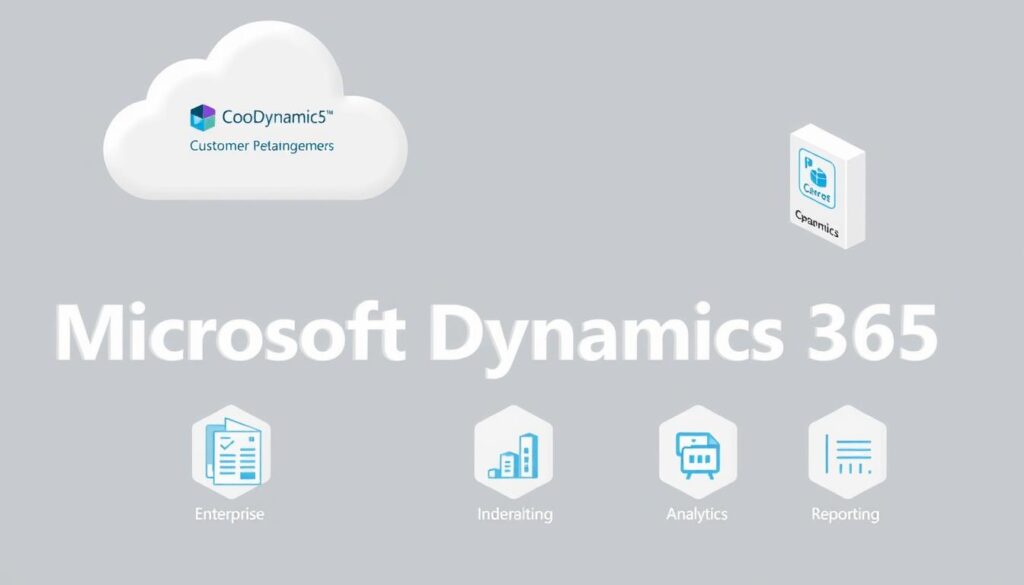
Dynamics 365 offers great flexibility for businesses. Companies can pick a pricing plan based on their needs. This makes it cost-effective for organizations of all sizes.
The platform has a unified user interface. It adjusts to different devices, ensuring a smooth experience. Users can work consistently across various platforms.
| Feature | Benefit |
|---|---|
| Editable Grid | Update records inline, improving efficiency |
| Web API Enhancements | Greater flexibility for developers |
| Customer Service Hub | AI-enabled insights for better service delivery |
| Learning Paths | Tailored interactive assets for user training |
Dynamics 365 has strong analytics and reporting tools. These empower businesses to make quick, data-driven decisions. The platform ensures consistent customer experiences across all channels.
From e-commerce to in-store interactions, Dynamics 365 connects everything. This makes it a valuable asset for modern businesses seeking growth.
Microsoft Dynamics ERP Solutions
Microsoft Dynamics ERP offers powerful tools for businesses of all sizes. These solutions streamline operations and boost efficiency. They’re designed to drive growth and improve performance.
Dynamics 365 Finance
Dynamics 365 Finance is perfect for large organizations, especially multi-national corporations. It excels at managing complex financial operations. The base license includes core features, while premium adds Business Performance Planning.
Dynamics 365 Supply Chain Management
This solution optimizes supply chain processes effectively. The core module costs $180 per user monthly. The premium tier, at $300, includes warehouse and service management features.
Dynamics 365 Business Central
Business Central, evolved from Dynamics NAV, suits small to mid-sized businesses. It provides comprehensive operational support with two pricing tiers:
| Tier | Price (per user/month) | Features |
|---|---|---|
| Essentials | $70 | Basic financial management, project management |
| Premium | $100 | Advanced features, service management |
These Microsoft Dynamics ERP solutions integrate smoothly with other Microsoft technologies. They offer real-time analytics and customizable dashboards for quick decision-making.
Dynamics AX and NAV have evolved over time. Many Dynamics GP users are moving to these modern platforms. They seek enhanced capabilities and cloud-based flexibility.
Microsoft Dynamics CRM Capabilities
Microsoft Dynamics CRM is a powerful tool for managing customer relationships. It’s part of Dynamics 365 and boosts business in sales, marketing, and customer service. This platform offers robust features to enhance operations.
Sales and Marketing Features
The sales module provides cutting-edge tools for sales teams. It includes sales forecasting, which predicts future wins and losses. The marketing component enables multichannel campaigns and real-time data tracking.
These features help improve the customer journey. Teams can create targeted campaigns and monitor their success effectively.
Customer Service Tools
Microsoft CRM offers omnichannel engagement for customer service teams. Service bots make interactions more efficient. AI measures key indicators to track customer relationships throughout the sales pipeline.
Field Service Management
Dynamics 365 uses IoT for field service teams. This enables faster problem detection and automated work orders. Real-time tracking improves technician monitoring and scheduling, boosting overall efficiency.
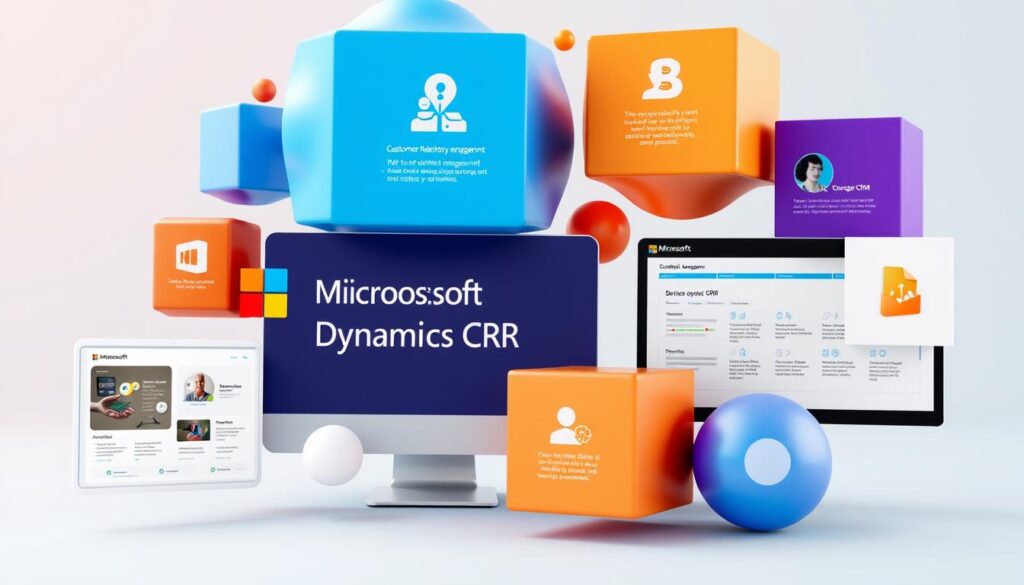
| Dynamics 365 Sales License | Monthly Price per User |
|---|---|
| Team Member | $8 |
| Sales Professional | $65 |
| Sales Enterprise | $95 |
| Relationship Sales | $162 |
Dynamics 365 offers flexible pricing with its SaaS model. Businesses can choose from basic team member licenses to comprehensive packages. This allows companies to select the right fit for their CRM needs.
Business Intelligence and Analytics Features
Microsoft Dynamics excels in business intelligence and analytics. It offers powerful tools for data-driven decision-making. Customizable dashboards and real-time reporting allow businesses to track key performance indicators easily.

The platform’s analytics benefit various departments. Sales teams can forecast trends effectively. Inventory managers can optimize stock levels with precision.
This comprehensive approach to data analysis sets Microsoft Dynamics apart. It provides valuable insights across the entire organization.
| Feature | Benefit |
|---|---|
| Self-service reporting | Reduced IT dependency |
| Augmented analytics | Broader access to insights |
| Embedded intelligence | Improved efficiency and satisfaction |
Dynamics 365 works smoothly with Power BI for advanced analytics. Users can gather data from many sources, including SQL databases. This creates a complete view of business operations.
The integration helps organizations adapt quickly to market changes. It provides a powerful tool for staying competitive.
“Organizations leveraging augmented analytics can potentially reduce dependence on specialized data scientists, allowing for broader access to data analytics.”
The platform’s visual workflow designer boosts automation without complex coding. This user-friendly approach makes data analysis more accessible. It helps create a data-driven culture throughout the organization.
Implementation and Deployment Options
Microsoft Dynamics offers flexible implementation options for various business needs. Companies can choose cloud-based or on-premises setups. These options align with different infrastructures and goals.
Cloud Implementation Process
Microsoft Dynamics cloud deployment streamlines the implementation process. It uses Lifecycle Services for efficient application management. This approach enables continuous improvement and updates.
On-Premises Setup Requirements
On-premises Microsoft Dynamics deployment runs in customer data centers. It requires dedicated application servers and SQL Server databases. This option supports production and sandbox environments.
Hybrid Deployment Solutions
Hybrid solutions balance cloud and on-premises options. Core customer data stays on-premises while certain service data is stored in Azure. This approach provides flexibility for specific organizational needs.
| Deployment Type | Key Features | Best For |
|---|---|---|
| Cloud | Continuous updates, seamless integration | Businesses seeking scalability and low maintenance |
| On-Premises | Local control, customized infrastructure | Organizations with strict data regulations |
| Hybrid | Flexibility, balanced approach | Companies needing both cloud benefits and local control |
Microsoft Dynamics implementations focus on delivering value through digital transformation. The process aims to eliminate data silos. It achieves outcomes only possible with seamless business connectivity.
Security and Compliance Features
Microsoft Dynamics 365 offers strong security and compliance features. This cloud ERP solution protects sensitive data and helps meet regulatory requirements. Its Microsoft Dynamics capabilities are designed for business protection.
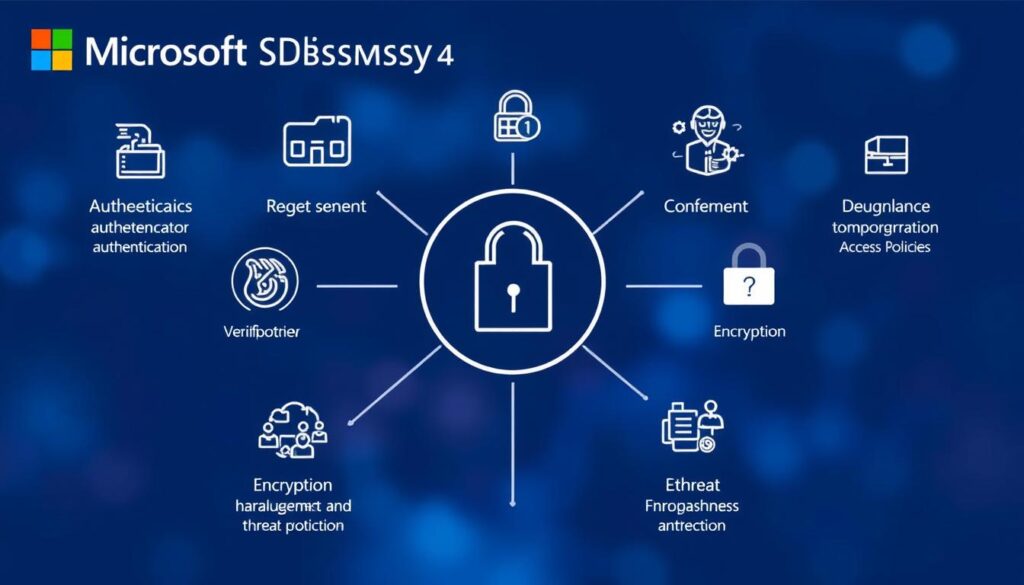
The platform’s security is built on Azure, with $1 billion invested yearly. This commitment has earned the trust of 95% of Fortune 500 companies.
Key Microsoft Dynamics features include:
- Advanced encryption
- Role-based access controls
- Comprehensive audit trails
- Compliance Manager for real-time risk assessments
The Microsoft Trust Center offers tools for GDPR compliance. Users can choose their Azure datacenter region for data storage. This ensures transparency and adherence to local laws.
“Microsoft’s security framework adapts to the latest global standards and industry-specific needs, maintaining data integrity in the cloud.”
The Microsoft 365 Security and Compliance Center monitors user activities and threats. It tracks malware and data loss incidents. Regular ISMS reviews enhance the platform’s security.
Strict coding practices through the Security Development Lifecycle further boost security. These measures make the platform more robust and reliable.
| Security Measure | Description |
|---|---|
| Vulnerability Assessments | Quarterly internal and external scans |
| Configuration Verification | Continuous checks for OS configuration drift |
| Access Control | Just-in-time access with logging and auditing |
| Encryption | BitLocker for host boot drives |
These features make Microsoft Dynamics 365 a trusted cloud ERP solution. Businesses can rely on its security and compliance measures.
Customization and Integration Possibilities
Microsoft Dynamics offers many ways to tailor the software to your business needs. Microsoft dynamics partners can help transform it into a powerful tool. This ensures the platform aligns perfectly with your processes.
Development Tools and Options
Microsoft Dynamics customizations range from simple app setups to advanced PaaS solutions. The platform supports low-code/no-code options using WYSIWYG designers. This reduces implementation effort compared to traditional coding methods.
For complex needs, pro development is available. It uses .NET-based languages, SDKs, and open-source libraries.
Third-Party Integration Capabilities
Integrating Microsoft Dynamics with other apps enhances its functionality. Azure Logic Apps enable seamless application and data integration. They automate workflows and improve business communication.
Azure Functions simplify complex computing processes. This allows developers to focus on adding business value.
| Integration Feature | Benefit |
|---|---|
| IoT Intelligence add-in | Enhances Finance and Operations apps |
| Connected Field Service | Integrates with IoT Central |
| Azure Logic Apps | Automates workflows and communication |
| Azure Functions | Simplifies complex computing processes |
Power Platform Integration
Power Platform integration expands Microsoft Dynamics’ capabilities. It allows for creating custom apps and automating processes. You can also analyze data without extensive coding.
This integration helps businesses adapt quickly to changing needs. It leverages the robust features of Microsoft Dynamics.
Microsoft dynamics consulting firms can guide you through customization options. They assess your needs and implement solutions. This ensures your Microsoft Dynamics setup delivers maximum value to your business.
Pricing and Licensing Models
Microsoft Dynamics offers flexible pricing options for various business needs. The platform has three main Subscription License types: User SL, Device SL, and Organization SL. User SLs are the most common, with Full Users, Team Members, and Activity Users subcategories.
Microsoft Dynamics partners help businesses understand the pricing structure. They guide you through options like the Team Member license at $10 per user monthly. This license offers read-only access with limited write capabilities.
The Dynamics 365 Enterprise Plan 1 license costs $115 per user monthly. Sales and Customer Service licenses are $95 per user monthly. Buying these separately saves $20 compared to the Enterprise Plan.
| License Type | Cost (Per User Per Month) | Features |
|---|---|---|
| Team Member | $10 | Read-only access, limited write capabilities |
| Sales/Customer Service | $95 | Full access to respective modules |
| Enterprise Plan 1 | $115 | Comprehensive access to multiple modules |
Microsoft Dynamics consulting firms help businesses optimize their licensing strategy. Companies can save by combining different license types. One case study showed $9,000 annual savings using a mix of licenses.
Training and Support Resources
Microsoft Dynamics offers many resources to help users get the most out of their software. These tools suit different learning styles and skill levels. Users can find what works best for them to use the platform well.
Official Microsoft Training Programs
Microsoft provides many training options for Dynamics users. The Microsoft Learn site has free online courses about using and setting up the software. These courses cover different topics and skill levels.
For those who learn by watching, the Microsoft Dynamics YouTube channel is helpful. It has tutorials, webinars, and product demos to watch and learn from.
Partner Support Network
Microsoft Dynamics partners help with setup and ongoing support. The FastTrack service uses Microsoft experts to make setup easier. Solution architects can learn from paths like “Use Success by Design for Dynamics 365 solutions”.
Community Resources
The Dynamics community offers support through forums and user groups. Users can ask questions in the FastTrack community and get answers from experts. TechTalks provide deep technical knowledge through live webcasts and on-demand videos.
| Resource | Description | Cost |
|---|---|---|
| Microsoft Learn | Online courses and learning paths | Free |
| YouTube Channel | Tutorials and product demos | Free |
| FastTrack Service | Implementation guidance | Varies |
| TechTalks | Technical webcasts and videos | Free |
These microsoft dynamics support options help users navigate the platform with ease. They can learn new skills and improve their business processes. Users have many ways to get help and learn more.
Conclusion
Microsoft Dynamics revolutionizes business software. It blends ERP and CRM capabilities, integrating various business operations. The cloud-based platform offers real-time insights and boosts efficiency for all organizations.
The platform’s features go beyond basic management tools. It enables data-driven decisions and streamlines processes. From predictive maintenance to sales forecasting, it meets modern enterprise needs.
Over 2500 experts implement Microsoft Dynamics for more than 500 global clients. Understanding its benefits is vital in today’s competitive market.
Microsoft Dynamics focuses on sustainability, compliance, and innovation. It’s not just software; it’s a strategic asset. The platform adapts to changing demands and market conditions.
